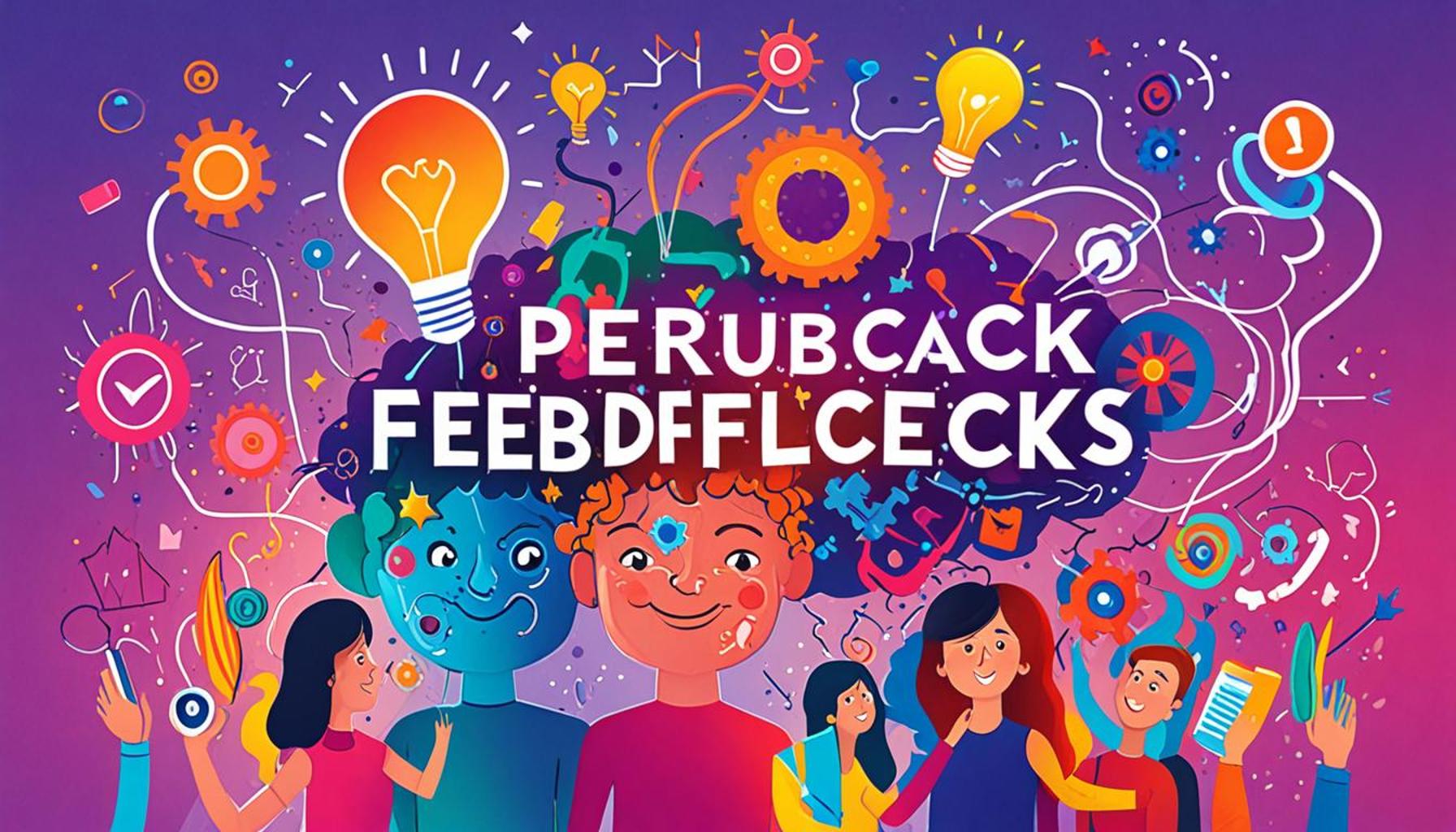Feedback and the Growth Mindset: Overcoming Resistance to Criticism

Understanding Feedback and its Impact
In today’s fast-paced world, feedback is crucial for personal and professional development. However, many individuals struggle to accept criticism, viewing it as a threat rather than an opportunity for growth. This resistance can hinder progress, especially in a vibrant environment like Nigeria, where collaboration plays a vital role in both business ventures and community initiatives. The ability to effectively give and receive feedback can significantly influence outcomes in various sectors, from education to entrepreneurship.
The Power of a Growth Mindset
Adopting a growth mindset is essential for overcoming this resistance. When we embrace this perspective, we recognize that:
- Challenges are opportunities to improve. For instance, a student struggling in a class might see feedback from a teacher as a chance to enhance their understanding rather than a personal failure.
- Effort leads to mastery and success. In the Nigerian context, a budding entrepreneur who receives advice on how to refine their business model can pivot and improve their strategies, ultimately leading to greater success.
- Feedback is a valuable tool for learning. An employee who receives constructive feedback from their supervisor can gain new insights into their performance, helping them to enhance their skill set.
Understanding these principles can transform how we perceive and respond to criticism, fostering resilience and a willingness to adapt in various aspects of life.
Barriers to Acceptance
Despite its importance, many still find it difficult to accept feedback. Common barriers include:
- Fear of failure. Many people in Nigeria fear that criticism may expose their vulnerabilities and lead to potential setbacks, creating a reluctance to engage in open dialogue.
- Defensiveness in response to criticism. It’s common for individuals to respond defensively when their work is critiqued, often taking it personally instead of viewing it as constructive input.
- Previous negative experiences with feedback. A history of unhelpful or harsh criticism can create a lasting aversion to receiving feedback, dissuading individuals from seeking out guidance.
Breaking through these barriers is fundamental to personal enhancement and community growth in Nigeria’s diverse landscape, where unity and teamwork are essential for progress.
Embracing Constructive Feedback
To thrive, individuals must embrace constructive criticism as a stepping stone toward greater achievements. In Nigeria, this is particularly vital as sectors like technology and agriculture increasingly seek collaboration and innovation. By fostering an openness to feedback, individuals can lay the groundwork for continuous improvement and success. For example, a cooperative of farmers in the northern region could benefit from peer reviews of their agricultural techniques, allowing them to implement effective practices that increase yield and contribute to food security.
Moreover, embedding feedback culture within educational systems through organized peer evaluations can enhance student learning experiences, making education more adaptive and relevant. Ultimately, the ability to accept and grow from feedback can catalyze transformative change, both personally and collectively, empowering Nigerians to reach new heights in various endeavors.
YOU MAY ALSO LIKE: Read read another article
Recognizing the Importance of Feedback
Feedback is an essential component of learning and growth, particularly in a context as dynamic as Nigeria. However, the challenge lies not just in receiving feedback but also in the mindset with which individuals approach it. A growth mindset—the belief that capabilities can be developed through dedication and hard work—can significantly reshape one’s relationship with feedback. With a growth mindset, individuals begin to see feedback as a crucial part of their journey rather than a stumbling block.
How Feedback Shapes Success
The impact of feedback extends beyond individual performance; it has the potential to foster cultural shifts within organizations and communities. In Nigeria’s bustling cities, entrepreneurs are constantly learning from each other, and the ability to accept constructive criticism can be the differentiator between success and failure. Case studies from local start-ups reveal that those who actively seek feedback and implement suggestions often outperform their peers. This leads to innovations that not only benefit their businesses but also contribute meaningfully to the economy.
For instance, in the tech industry, several software developers have shifted their approach to coding based on feedback received from their peers during collaborative projects. They share insights and critiques that help refine their work, leading to applications that are user-friendly and more functional. Engaging in such practices cultivates an environment where sharing ideas and learning from mistakes is encouraged, reinforcing that feedback is a pathway to improvement, not a source of embarrassment.
The Role of Feedback in Building Resilience
Another essential aspect of feedback is its role in fostering resilience. By learning to accept and incorporate feedback, individuals can build their confidence over time. However, this journey often involves acknowledging discomfort. Specific factors may affect this acceptance, including:
- Perceived personal attacks. Many people view feedback as a critique of their character rather than an evaluation of their work, leading to emotional responses that can inhibit growth.
- Comparison with others. In highly competitive environments, such as Nigeria’s bustling markets, individuals may fear that feedback will highlight their shortcomings in comparison to peers, resulting in a reluctance to engage with constructive criticism.
- Cultural norms. Certain cultural contexts may discourage open discussions about weaknesses; thus, many individuals may shy away from feedback for fear of disrupting harmony or respect.
Understanding these barriers is critical. Embracing feedback can empower individuals by transforming perceived threats into opportunities for learning, thus paving the way for personal and communal progress.
Creating an Open Feedback Culture
To cultivate a positive environment around feedback, it’s essential for leaders, educators, and peers to model receptiveness and constructive critique. Initiatives can promote a culture where feedback is viewed as a shared responsibility rather than just an evaluative measure. For example, businesses can implement regular performance reviews that emphasize collective improvements instead of individual shortcomings, leading to a more cohesive unit focused on mutual success.
In conclusion, the journey toward overcoming resistance to criticism begins with recognizing the transformative power of feedback. By adopting a growth mindset and fostering an open culture around feedback, individuals in Nigeria can enhance their skills, contribute to their communities, and ultimately lead fulfilling lives. The path to success is rarely linear, but with resilience nurtured through feedback, the destination becomes ever more attainable.
| Advantages of Feedback | Growth Mindset Implications |
|---|---|
| Promotes Self-Awareness | Encourages proactive learning behaviors |
| Enhances Performance | Fosters resilience in the face of challenges |
| Builds Stronger Relationships | Cultivates a collaborative work environment |
| Encourages Growth and Development | Creates a culture of continuous improvement |
Understanding the advantages of feedback and blending it with a strong growth mindset not only helps in overcoming resistance to criticism but also promotes a culture of continuous development. When individuals become aware of their strengths and weaknesses, they are better equipped to embrace constructive criticism. This dynamic interplay enhances not just personal performance, but also the overall synergy of teams. The foundation of such a culture establishes strong relationships through honest dialogues and mutual respect, creating environments where feedback is not feared but embraced. In addition, this philosophy of ongoing learning fosters resilience, preparing individuals to tackle challenges more effectively, thus transforming potential setbacks into powerful learning experiences.
YOU MAY ALSO LIKE: Read read another article
Strategies for Embracing Feedback
In cultivating a growth mindset, individuals must explore practical strategies that help them embrace feedback more openly. Shifting perspective is one critical approach; rather than viewing feedback as an attack, individuals can reframe it as a tool for honing their skills. This mindset transformation can be aided by engaging with mentors or peers who provide constructive insights. For example, in various communities throughout Nigeria, local training sessions or workshops have emerged, allowing participants to practice receiving and giving feedback in supportive settings. These platforms foster a sense of community as participants celebrate each other’s progress, effectively diminishing the fear often associated with criticism.
Encouraging Timely and Specific Feedback
Feedback is most effective when it is both timely and specific. In environments such as schools and workplaces, individuals should advocate for feedback to be delivered as soon as possible after a performance or project, allowing for immediate reflection. This timeliness can transform initial emotional reactions into productive discussions. In a country like Nigeria, where collaborative projects like group assignments and team ventures are commonplace, making an effort to address feedback within these settings fosters a culture of accountability. This approach encourages people to understand that criticism is not a personal indictment but rather a necessary ingredient in the recipe for improvement.
Moreover, the specificity of feedback cannot be overlooked. Rather than general statements that may leave individuals unsure of the next steps, detailed feedback illuminates clear pathways for growth. For instance, an artisan in Nigeria working on handmade crafts can benefit from precise critiques on their design choices or material selection, leading to a more targeted development process.
Utilizing Feedback for Continuous Improvement
Feedback should be integrated into an ongoing cycle of improvement. To enhance this process, individuals might consider regular check-ins where they actively seek feedback after completing specific tasks. In Nigerian workplaces, where job performance can be pivotal for career advancement, establishing a routine feedback loop can instigate significant growth. For instance, call centers may implement daily or weekly briefings where team members can exchange feedback on customer interactions, resulting in improved service delivery.
In the educational sphere, teachers can prompt students to reflect on peer feedback regarding group projects. This not only diversifies the learning experience but can also help students recognize that everyone’s perspective adds value. Such practices enable students to appreciate diverse viewpoints, thereby reinforcing the growth mindset.
Feedback through Peer Mentoring and Networking
Peer mentoring plays an instrumental role in promoting a culture of constructive feedback. Engaging in peer mentoring programs, such as those spearheaded by various organizations in Nigeria, allows individuals to receive advice from others at similar career stages. These partnerships can lead to candid conversations about challenges faced and insights gained. The mutual sharing of experiences can also aid in building resilience, as mentees learn that setbacks are shared experiences rather than individual failures.
Networking events, also prevalent in urban centers like Lagos and Abuja, further provide opportunities for individuals to connect and exchange feedback in informal settings. These interactions can diminish barriers to receiving criticism, as individuals seek to learn from one another’s experiences. The key is to acknowledge that feedback, regardless of its form, is instrumental in shaping one’s journey towards success.
ADDITIONAL INSIGHTS: Expand your understanding here
Conclusion: Embracing Feedback for Growth
In reflecting on the relationship between feedback and the growth mindset, it is clear that overcoming resistance to criticism is essential for personal and professional development. By actively shifting our perspectives and engaging with feedback as a valuable tool rather than a threat, we unlock the potential for continuous improvement. The strategies discussed highlight how important it is to seek out timely and specific feedback that paves clear pathways for enhancement, while fostering an environment where constructive discussions replace fear.
The integration of feedback into a routine practice not only strengthens our skills but fortifies our resilience. In context, Nigerian workplaces and educational settings can greatly benefit from implementing feedback as a cornerstone of collaborative growth, promoting a richer learning experience. Moreover, embracing peer mentoring and networking can bridge gaps, transforming criticism into shared learning experiences that cultivate a supportive community.
Ultimately, adopting a growth mindset in response to feedback redefines our approach to criticism. It encourages not just acceptance, but a proactive stance towards self-improvement. As individuals learn to leverage feedback effectively, they will discover that criticism is not merely an obstacle but a vital ingredient that propels them toward success. Understanding that each piece of feedback is a stepping stone on the path to expertise can fundamentally elevate how we view our progress and potential, inspiring a transformative journey toward excellence.



